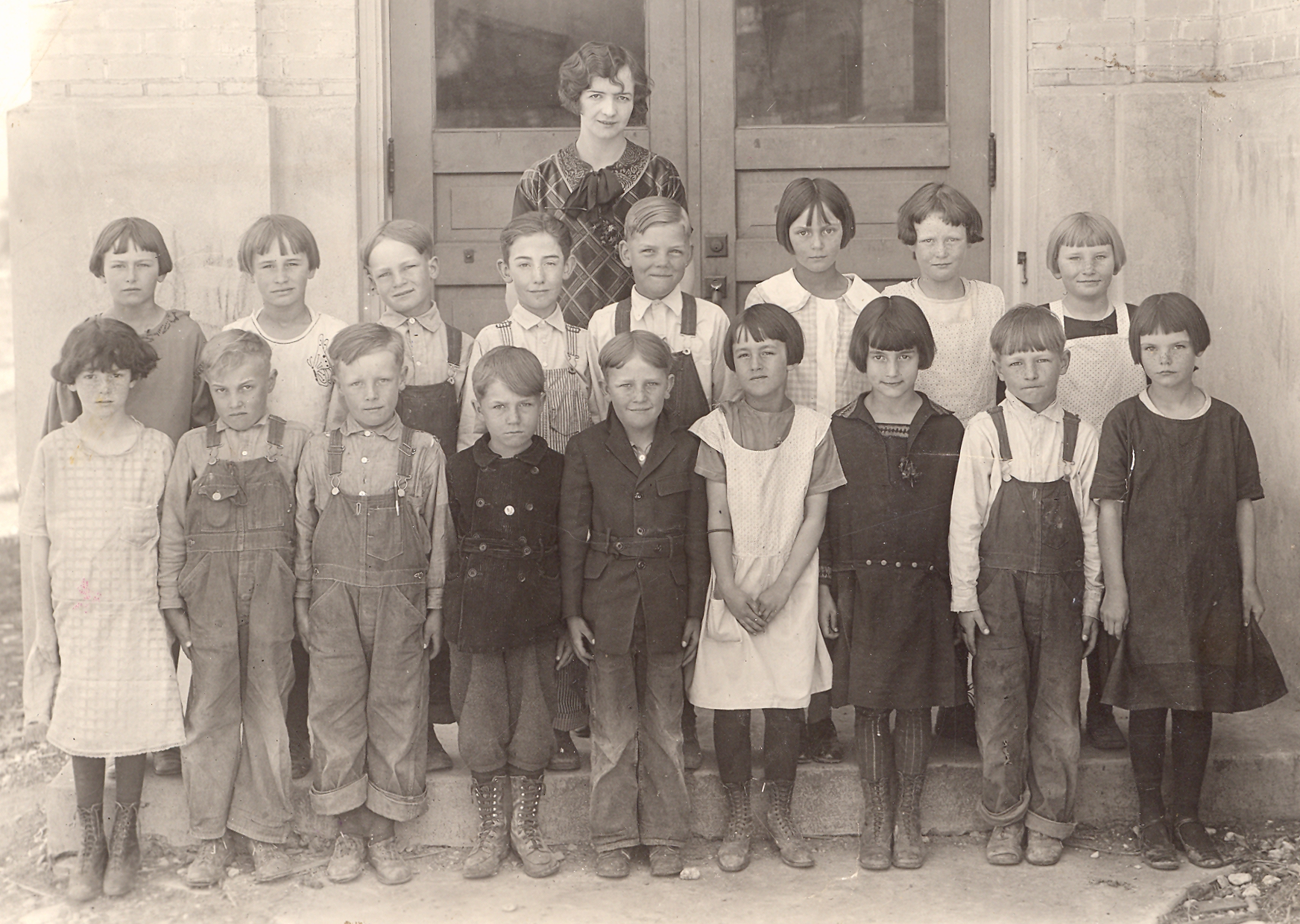PART I
Growing Up
Chapter 1
CLARKSTON
Gordon enters his own story
at 2:10 a. m. on July 1, 1918, an early Monday morning. He was
blessed by Thomas Godfrey on August 4th 1918.
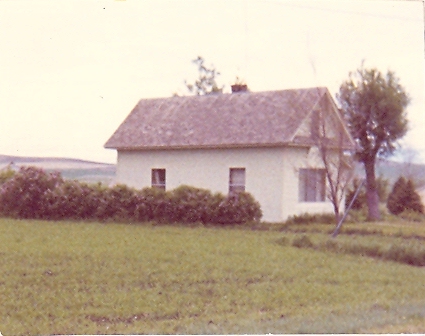
At this time, Woodrow Wilson was the President of the United States which was involved in the “Great War” which later became known as World War I. The war ended on November 11, 1918 but before long the nation was faced with another crisis which affected Gordon and his family. As the soldiers came home from Europe, they brought with them a deadly influenza virus. That fall, the terrible Asian Flu epidemic swept the country. Mary, Gover, Ervin, and Gordon were all flat in bed with terribly high fevers. Mary’s mother took care of the stricken little family. Everyone wore gauze masks. Despite this precaution, Liza was soon as sick as the rest of them.
Church and school was
canceled from October 1918 until January 5, 1919 due to the flu.
Mary’s cousin, LaRee Barson, was asked to help take care of the
very sick family. An uncle called on them each morning to see what
supplies were needed. LaRee did her best tending the baby and taking
temperatures but soon became sick herself. Very few people in town
escaped the epidemic, some even died. The funerals were held out in
the open and everyone wore gauze masks. A few young men in town went
from door to door doing the milking and other chores. Eventually
Clarkston lived through the epidemic.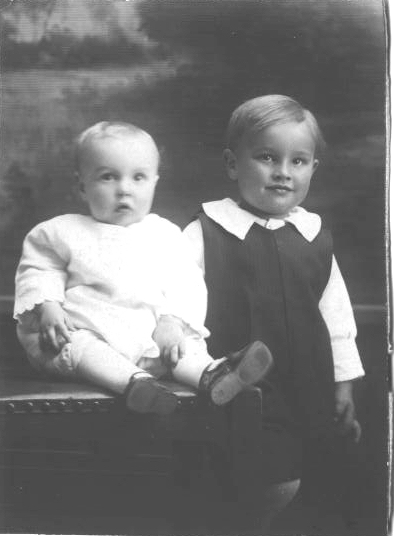
This family was off to a
happy start with their two little boys. Gover and Mary each had a
rocking chair in which they would take a little boy and rock him to
sleep every night. This lovely young mother stated that she wanted to
have ten children. She was pleased to make the announcement that a
third child would be added to their family in September.
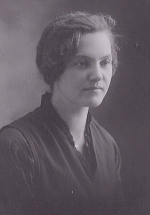
Mary Eliza Godfrey
On September 25, 1920 Milton Rudger was born. What should have been a blessed and happy event, became a dark and tragic day. Mary died in childbirth at the young and blossoming age of twenty-two. Gordon never really knew his mother.
Gover was now alone with three small children without a mother to care for. Ervin was four, Gordon two, and Milton was just a baby. Not being able to care for his little boys and run the farm, he turned to his family for help and moved his motherless family in with his widowed mother.
She had a large house with
plenty of room. Gover could still run the farm and have his sons
cared for by his mother and sister, Archulious, who still lived at
home. His brother, Wallace, still lived at home at that time too.
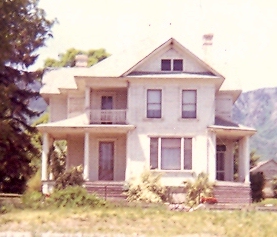
Gordon was a little boy with white curly hair and brown eyes and was into probably more than his share of mischief. Once when he was about three or four he got into some black, sticky axle grease used to grease wagon wheels and farm machinery all over in his hair. Aunt Archulious had quite a time getting his hair clean again. His hair was hard enough to comb as it was because it was so thick and curly anyway. When she would comb out that snarled, matted, curly white hair he would bawl and carry on something fierce.
Gordon and Ervin picked up foul mouths at a real early age. When Aunt Archulious' husband to be, David Archibald, came courting, those two little tykes would hide under a bed or behind the couch and try out their newly learned vocabulary of cuss words and giggle. Aunt Archlious didn't like swearing so Dave would chase them down, which was great sport for the little boys, until they got caught. When Dave caught them he held them over his knees face up and pulled their tongues out with his fingers as Aunt Achulious poured cayenne pepper on their tongues. When they turned the darling little brats loose, they ran off drooling, and spitting, and swearing.
After living with Grandmother Buttars for about two years, Gover remarried. His new bride was Mary Harriet Bowles from Lewiston, Utah. They were married June 28, 1922 in the Logan Temple. After they were married, Gover moved his new wife and two of his sons back into his own house. Milton lived with his grandmother until he was about eight. As the kids grew up they called their stepmother Aunt Mary.
In 1923 or 1924 Gover bought his first car, a brand new Model T Ford. Aunt Mary had Gordon with her when she took the car to learn to drive. She nearly scared little Gordon to death. With a car, now it only took about an hour to drive the twenty miles to Logan. Gordon can remember making the trip in a white top buggy drawn by a team of horses. Then, the trip took over four hours.
To go to Logan was a treat for a little boy. Gordon loved to go to Logan with his father. One day Gover needed to go to Logan for something and naturally Gordon wanted to go. At dinner, Gover took a meat fork full of cooked cabbage and put it on little Gordon's plate. Gordon turned up his nose because he didn't like cabbage. Gover put salt and pepper and butter on it and fixed it up so it would taste good. "Now," he said, "If you eat this, you can go to Logan with me." Gordon ate his cabbage and got go to Logan. At the same time he learned to like cabbage.
On one trip to Logan, Gordon and Ervin were attracted by a pall parrot perched on a sign in front of a shoe store. As people walked by, the parrot would squawk out "Hallow". They wanted to talk to the bird but didn't get much response so they commenced shaking the sign to see if they could get him to talk. The poor old parrot clung to the sign squawking, "Downt! Downt! Downt!” The storekeeper ran outside to see what all the commotion was about and down the sidewalk they dashed.
In about 1924 the family
moved to a new place out of town, down down by the creek. That same
year Gordon started school. The next few years had many adventures in
store.
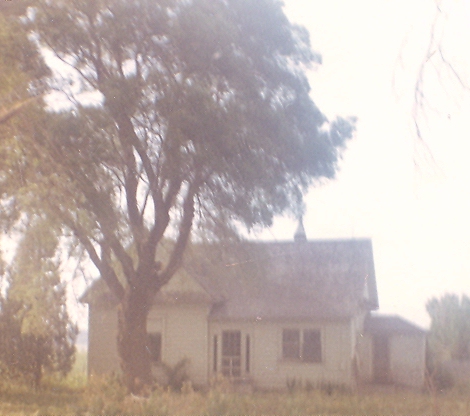
The house down by the creek
Gordon had a little dog named Sweed who became his faithful friend. Uncle Ervil (his mother's brother) made a little two-wheeled cart with a pair of shaves so Sweed could pull Gordon around in it. He had to sit just right to balance the cart. If he sat to far back, the cart would rare pulling up on Sweed and he would turn around and "chew all hell" out of him. If he sat too far ahead it would put all the weight on Sweed and he'd turn around again. As long as he kept balanced, Sweed could pull him all over the place. Sweed could pull him in a little sleigh too.
Sweed was a good dog to have around. You could stand in the yard and throw your arms showing him where the cows or horses where and he would bring them in on a dead run, almost knocking down the fences. One day he and Gordon went down the creek to catch magpies. He heard that magpies could talk when their tongue were slit. They were not able to catch any to find out if it was true.
Gordon also had a pony named Old Cassey. Her tongue hung out the side of her mouth. When she got a drink of water she had to bury her nose in the water past her nostrils so she could drink.
At times Gordon would sneak away from Aunt Mary and ride Old Cassey up by the cemetery where the farm was to watch his dad work. The big thing to do was to ride side saddle. One day he was bringing in the cows perched on the saddle sideways thinking he was neat, until he fell off backwards practically landing on the back of his head. Old Cassey stopped for him as Gordon got up shaking his head. When he got to the yard, Gordon was sitting in the saddle like he should.
A neighbor by the name of Bois Jardine made Gordon a pair of wire spurs. He got on Cassey and jabbed her in the ribs expecting her to go. Instead, Old Cassey turned around and bit him on the leg. The spurs weren't such a good idea after all so he didn't use them anymore.
When Gordon was a little boy, his Great-grandfather Peter S. Barson was still alive. Grandpa Barson would gather all of his great-grandchildren and seat them on the floor and play an old fiddle and a wind up phonograph that had a little man that danced around the record as it played. He gave each of them a nickel to sit on the floor and listen to him play his fiddle and tell stories of fighting Indians or riding fort the Pony Express. If one of the kids got up to leave, he took the nickel away from them. As a young man, Grandpa Barson got in on fighting Indians when Clarkston was first settled and had plenty of stories to tell. When Gordon was born it had been less than thirty years since the last of the great Indian Wars so there were plenty of stories to be told.
These stories had Gordon scared of Indians. At times the Indians came off the reservations to go about begging for flour and food. When he saw them coming up to his grandmother's house, he would immediately leave his playing and run in the house and hide under the table.
Being located on the slopes of the Wasatch Mountains, Clarkston got a lot of snow in the winter. Snow and kids could mean only one thing, sleigh riding. There was always a huge snowdrift out from his grandmother's barn. All the kids in town brought their sleighs to the top of the drift and would ride them down. The more kids on a sleigh, the faster and farther they could go. One of Gordon’s cousins was bigger than the rest of the kids. He would lie down on his sleigh and pile four or five smaller children on top of himself and down the run they'd go. They got going so fast that sparks flew from the runners as they skimmed over the snow. They could go clear down to the creek, almost a mile and a half away.
When it wasn't sleigh riding
in the winter, it was the swimming hole in the summer. This swimming
hole was just down the creek from their house. According to legend,
the swimming hole had no bottom because a runaway team of horses
drown there. Even though the water was ice cold, there were always
ten or twenty kids in there swimming. They'd dive in one side and
come up the other into some wild rose bushes, but that didn't stop
anyone.
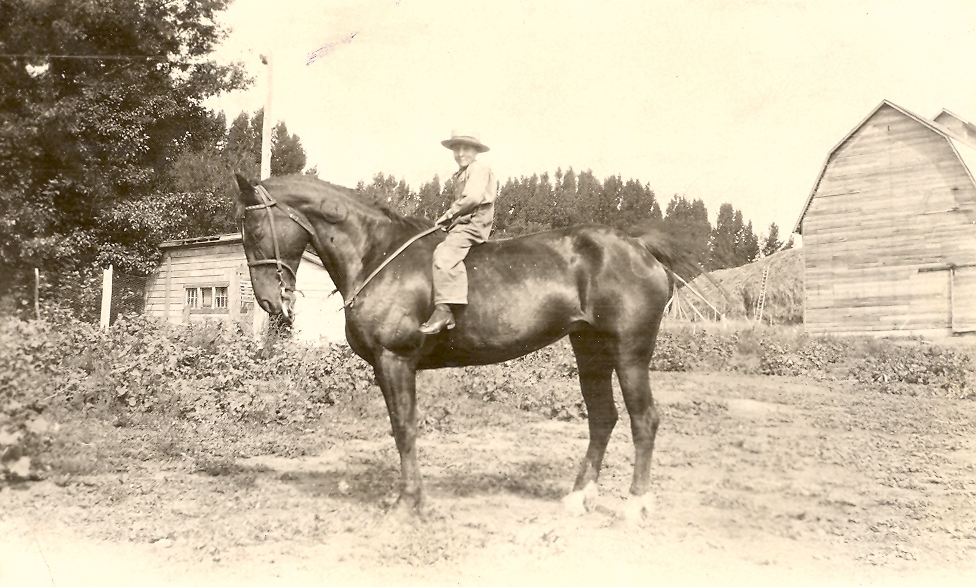
Gordon and Topps at Grandmother Godfrey’s. Topps was one of Gover’s many horses.
Gordon had his chores too, so there wasn't always time to play. He was milking cows before he was big enough to go to school. He wasn't big enough to lift the buckets after he had filled them so his dad dumped them in the milk can. By the time he was eleven he could milk as fast as his dad.
At haying time, his job was to ride the team that worked the derrick. When the men went out after another wagon load he would ride the wagon. On one Fourth of July they were stacking hay and a bunch of kids were going down to the swimming hole and stopped to ask, "How come you're stacking hay on the 4th of July?” The hired man answered, "So we don't have to do it on the 5th."
After the chores were done they made their own fun too. Gover used to raise purebred ewes. Once during lambing season it was stormy so he put them in the barn. Gordon and Ervin got the idea they would trip the ewes as they went through the door. Ervin had the handle end of a fork and Gordon had the tines. The sheep tripped over the fork handle alright, and somehow one of the tines got into Gordon's wrist but he didn't feel anything. His next move was up the ladder to the loft. As he reached up to the next rung with that arm to pull himself up, all of his weight caused the puncture to finish breaking open. The blood squirted, he squealed and fell off the ladder, and ran in the house to get bandaged. The wound healed without needing stitches but it left a definite scar on his wrist.
After getting bandaged, Gordon and Ervin went back to the barn to ride sheep. When their dad caught them, well, talk about a sheepherder kicking his dog. When Gover got a hold of them, the buttons were flying off their clothes to where it sounded like a hail storm in that old barn. Boy, did they get a walloping.
Another day they caught a Rambulet buck in the barn so they could ride him. Now, when a sheep jumps, it jumps stiff legged, so a little kid seven or eight years old would naturally fall off. When it was Ervin's turn to ride him, Gordon went to the other side of the barn and opened a door that was never used because there was a three foot drop. When a sheep sees an opening they most always go through it. When this old buck saw the light through the door, out he jumped with Ervin right on his back. The buck landed just short of the creek and Ervin flew off his back and landed in the dirt. The ram got in with the ewes where he wasn't supposed to be. Gordon jumped out of the barn door and Ervin got up brushing the dirt off his clothes. Now they had to get the buck out of the ewes before anything happened.
In the days of work horses, there used to be a contest called a pulling match. The object was to see who had the strongest horse or team of horses. Ervin and Gordon would have their own pulling matches using their father's work horses. Those little boys would get the teams harnessed up themselves and hitched them back to back to get them to pull. A lot of the time this would balk a good team, or get them so they wouldn't pull anymore. They managed to ruin a team for their dad. This team was Vick and June. Soon after, Gover had Vick and June hitched to a load of gravel but they just wouldn't pull it.
It wasn’t hard to figure out what was wrong and naturally he got mad. He made the culprits (Gordon and Ervin) walk up to City Creek where Blanche and Bolley were pastured. Blanche and Bolley were Gover's best team. They caught them and put their collars and harnesses on and brought them back to Gover so he could hitch them to the wagon. When they started pulling, Blanche chocked down because they put too small of a collar on her and it cut off her wind. Gover got mad and worked their pants over once more. He was going to make the boys walk home and get the right collar, but instead of wasting anymore time, Gover tied Blanche back and had Bolley pull most of the load.
The little boys in Clarkston would put their dogs up against each other in dog fights. The boy whose dog lost would inevitably tear into the boy whose dog won. A lot of times there were gang fights too. Several smaller boys would tear into an older kid. Gordon and Ervin got in on their share of the action.
It was in Clarkston when Gordon started smoking. The thing to do was to peel the bark off of a cedar post and shred it up real fine in their hands. Then they'd “roll there own” and light up. Puffing on that burning cedar bark sure tasted nasty so they switched to tobacco .
In Clarkston, their family
usually went to church. Gordon remembers going to Primary. Some of
his teachers remember him too. One of them told a story about him.
She asked him too say the prayer one day. Gordon stood up and bowed
his head and folded his arms. Then there was a long pause. After a
minute he said, "Oh, hell. I don't know how!” and sat down.
Gordon was baptized on 4 July 1926 by George D. Loosle and confirmed
by Joseph G. Christensen.
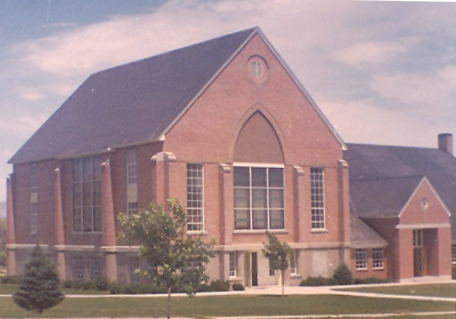
The Clarkston Ward Meetinghouse
that was dedicated in 1913
He had a cousin, Susie Buttars, who was in his class. When the teacher called the roll, he was clowning around. When she called Susie's name he hollered, "Present" That got all the rest of the kids teasing Gordon and calling him "Susie."
The old School stood in the lot next to the Ward Building. It was a two story building of yellow brick. There were four big rooms, two downstairs and two upper rooms. Each room had about fifty desks. In each room were two grades. For example, in one room were the first and second grades, in another were the third and fourth, and so on. The school had a big bell that could be heard allover town. It rang at eight o'clock in the morning, giving the children one hour to get ready for school, which started at nine when the bell would ring again.
Gordon started school in 1924 when he was six years old. His first grade teacher was Gretta Tippets. He thought she was very pretty. Gordon knew how to tell time before he went to school. He had a pocket watch that he carried with him and the other kids were always asking him for the time. He about wore it out by taking it out of his pocket all of the time. It was a West Clock pocket watch that cost ninety-eight cents.
One morning in about the
first or second grade, one of the bigger kids lifted Gordon up and
made him grab a hold of the bell rope and left him hanging. His
weight was just enough to keep the bell going around and around and
he was going up and down. It was too far to the floor so he was
afraid to let go for fear of hurting himself. The bell kept going
around and around and up he went again and then down he'd come. The
bell rang at the top and on the bottom and a few times in between. As
the bell came down it picked up enough speed to go on over again and
up he would go again. Everyone in town heard the bell ringing and
wondered what in the world was going on. Finally someone came and
rescued him.
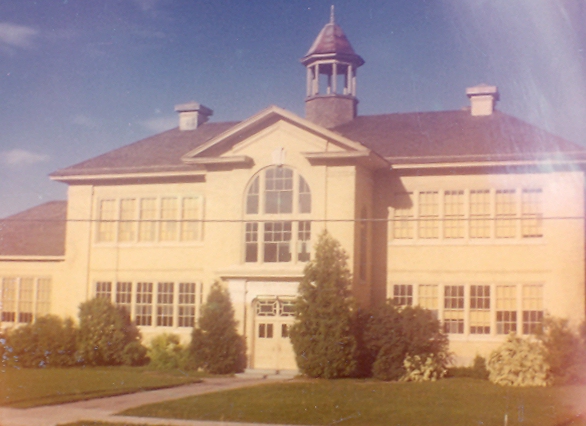
The Clarkston School built in 1910.
On April Fool's Day in the fourth grade a bunch of kids (Gordon included) got in the school house before any one else was there and took the door knob off the door in one of the upstairs rooms. In its place they put a bolt with a big washer on it. To the bolt they tied one end of a rope. With the other end of the rope they tied several desks together. With the use of another rope they climbed out the window to the ground. When the teacher went to her class room, she couldn't get in because there was no door knob. Nor could she pull it open because it was tied to all the desks. Finally, they had to get someone with a ladder to climb through the window to untie the rope.
One day she had about twenty-five kids running around the room after school. Golden Buttars (who was Gover's cousin) burst into the room and let out a blat at her and told all those kids to get home to their chores. Then he proceeded to set Miss Heggie strait. Never again did she make anyone run around the class room after school.
Gordon's fourth grade teacher was Miss Smith. In the same class was his cousin, Ira Jardine. (With all these cousins, you have probably figured out that he was related to about half of Clarkston.) One day in class, Miss Smith did something to one of them, the other one got mad too, so they both jumped up to try to fight her.
His fifth grade teacher was quite a change from Miss Heggie or Hiss Smith. She was a middle-aged woman from Virginia. She was about his favorite teacher, but he can't remember her name. She couldn't sing but she had to teach music and singing. She taught them songs like, "Way Down Yonder in the Cotton Field", and her favorite, “Carry Me Back To Old Virginny." Since she couldn't sing at all, the kids would laugh at her. She had quite a chore teaching the kids how to sing.
In the late 1920's, Gover bought the family's first radio. Being so close to the mountains the reception was very poor. They had to huddle close around the radio to hear Amos and Andy, and the other programs being aired.
After being married for almost six years, Gover and Aunt Mary had their first child. On February 18, 1928, Gordon's half brother Nolan was born. Something went wrong in the delivery that caused him to be stillborn. Nolan never took a breath of this life. Then on January 30, 1929 William Ralph was born. Soon after Ralph was born, Gover moved his family to Burley, Idaho where he had bought a sixty acre farm with good sized house. Moving away from Clarkston was hard for Gordon. This move changed the course of the rest of his life.
